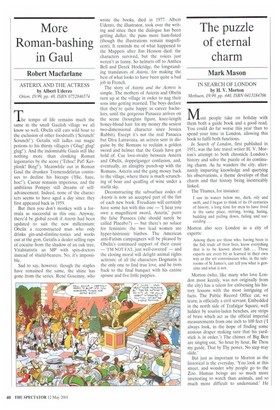More Roman-bashing in Gaul
Robert Macfarlane
ASTERIX AND THE ACTRESS by Albert Uderzo Orion, 0.99, pp. 48, ISBN 0752846574 he tempo of life remains much the same in the small Gaulish village we all know so well. Obelix still eats wild boar to the exclusion of other foodstuffs (`Scrunch! Scrunch!). Getafix still ladles out magic potions to his thirsty villagers (`Glug! glug! glue). And the indomitable Gauls still like nothing more than clonking Roman legionaries by the score (`Tchoc! Paf! Kerplonk! Bing!'). Meanwhile out in Roman Gaul the drunken Tremensdelirius continues to decline his hiccups (Hie, haec, hoc!), Caesar remains imperious, and the ambitious Pompey still dreams of selfadvancement. Indeed, none of the characters seems to have aged a day since they first appeared back in 1959.
But then you don't monkey with a formula as successful as this one. Anyway, there'd be global revolt if Asterix had been updated to suit the new millennium: Obelix a reconstructed man who only drinks gin-and-slimline-tonics and works out at the gym, Getafix a dealer selling raps of cocaine from the shadow of an oak tree, Vitalstatistix an MP with spin-doctors instead of shield-bearers. No, it's impossible.
Sad to say, however, though the staples have remained the same, the shine has gone from the series. Rene Goscinny, who
wrote the books, died in 1977. Albert Uderzo, the illustrator, took over the writing and since then the dialogue has been getting duller, the puns more ham-fisted (though the illustrations remain magnificent). It reminds me of what happened to the Muppets after Jim Henson died: the characters survived, but the voices just weren't as funny. So helmets off to Anthea Bell and Derek Hockridge, the longstanding translators of Asterix, for making the best of what looks to have been quite a bad job in French.
The story of Asterix and the Actress is simple. The mothers of Asterix and Obelix turn up at the village in order to nag their sons into getting married. The boys declare that they're quite happy as career bachelors, until the gorgeous Panacea arrives on the scene (hourglass figure, knee-length honey-blond hair: for my money the sexiest two-dimensional character since Jessica Rabbit). Except it's not the real Panacea but Diva Latraviata, an actress sent in disguise by the Romans to reclaim a golden sword and helmet that the Gauls have got hold of. Cue love-rivalry between Asterix and Obelix, doppelganger confusion, and, eventually, an almighty punch-up with the Romans. Asterix and the gang mosey back to the village, where there is much scrunching of boar and quaffing of wine under a starlit sky.
Deconstructing the subsurface codes of Asterix is now an accepted part of the fun of each new book. Freudians will certainly have some fun with this one — 'I hear you own a magnificent sword, Asterix,' purrs the false Panacea (she should surely be called Placebo?) — but there's no solace for feminists: the two lead women are hyper-histrionic bimbos. The American anti-Fatism campaigners will be pleased by Obelix's continued support of their cause — 'I'M NOT FAT, just well-covered' — and the closing moral will delight animal rights activists: of all the characters Dogmatix is the only one to find true love, and he trots back to the final banquet with his canine spouse and five little puppies.


































































 Previous page
Previous page